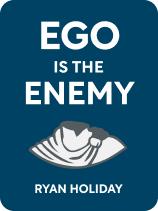

This article is an excerpt from the Shortform book guide to "Ego Is the Enemy" by Ryan Holiday. Shortform has the world's best summaries and analyses of books you should be reading.
Like this article? Sign up for a free trial here .
Do you believe that visualizing your dreams can help you make them a reality? What if it has the opposite effect?
You might have heard self-help gurus talk about the power of visualizing your goals. While visualizing the desired final outcome of your efforts could be helpful in keeping your goals top of mind, too much visualization can actually have the opposite effect.
Here is why goal visualization can sometimes be a double-edged sword.
Visualization: A Double-Edged Sword
Visualization can be a powerful psychological tool: visualizing your goals can convince your subconscious mind that you are successful, which can prompt you to act in successful ways.
On the other hand, too much visualization can actually have the opposite effect: After a certain point, your subconscious mind confuses visualization with actual progress. If you talk about, think about, and explain a project long enough, you begin to feel you’re closer to achieving it, even though you may not have taken any actual, measurable steps toward your goal. It feels like you’ve been productive if you’re spent five hours talking about something—but you haven’t, and you may not have any psychological energy left to take actual action.
Upton Sinclair, who decided to run for Governor of California in 1934, is an example of how visualization can be a double-edged sword. In an unusual method of self-promotion, Sinclair published a short book called I, Governor of California, and How I Ended Poverty: A True Story of the Future. The book outlined—in the past tense—all the policies he’d enacted as governor, as if he were looking back on a successful, productive term. As noted by friends of his around that time, he then promptly lost all interest in the campaign. It was as if his own self-promotion had convinced him he’d done the hard parts, and there was no need to keep trying, and he lost the election by a significant margin.
Negative Visualization May Be More Useful
The negative effects of visualization are supported by science. Researchers examining the effects of visualization on goal achievement have found that when subjects used positive visualization techniques for a goal they wanted to accomplish, they lost energy for that goal and were less likely to achieve it. This effect held true even if the subjects were simply visualizing positive things that might happen in the coming week: After visualizing, they accomplished less during the week.
In contrast, subjects who either visualized negative things or thought about the possibility that they might not achieve their goal had higher energy and accomplished more afterward.
The researchers hypothesize that visualizing a positive outcome has a relaxing effect on the body (one way they measured their subjects’ reactions was by tracking their systolic blood pressure, a useful proxy for either relaxation or anxiety). For this reason, psychologists sometimes use positive visualization techniques to help anxious patients relax. However, if your goal is to accomplish something that requires energy and action, such relaxation techniques can be counterproductive.

———End of Preview———
Like what you just read? Read the rest of the world's best book summary and analysis of Ryan Holiday's "Ego Is the Enemy" at Shortform .
Here's what you'll find in our full Ego Is the Enemy summary :
- How to resist your emotions so you can keep thinking clearly
- Why your passion may be preventing you from achieving your goals
- How to apply the philosophy of Stoicism for success as a leader






